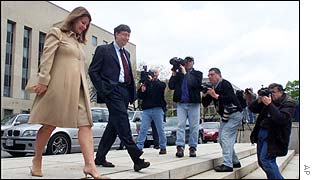| You are in: Business | ||||||||||||||||||||||||||||||||||||||||||||||||||||||||||||||||||||||||||||||||||||||||||||||||||||||||||||||||||||||||||||||||||||||||||||||||||||||||||||||||||||||||||||||||||||||||||||||||||||||||
|
Saturday, 2 November, 2002, 02:12 GMT
Microsoft buoyant after court ruling

Melinda and Bill Gates outside the court
A federal judge in the United States has endorsed a much contested anti-trust settlement between computer software giant Microsoft and the government, as well as nine individual American states.
Sanctions imposed on Microsoft under the settlement stand to give consumers greater choice over the software they can use whilst avoiding damage to the company.
The news was released after the markets closed on Friday. Nine other states believe the settlement is too lenient but the judge said she believed there was "little, if any, legitimate justification" for tougher sanctions. Attorney General John Ashcroft welcomed the ruling as a "major victory for consumers and businesses". Microsoft itself said it would be reviewing the ruling but was "committed to resolving [the] issues in a constructive way" as its stock jumped by $3.70, or 7%, to $56.70 a share in after-hours trading. "We are pleased to put another step in this case behind us," said Chairman Bill Gates. The company has long argued that the anti-monopoly suit against it was inspired by its commercial competitors. Made to open up The settlement was agreed in November 2001 after Microsoft was convicted of abusing its worldwide dominance by flouting competition rules. The terms finally endorsed by Judge Kollar-Kotelly on Friday will be enforced over five years and stipulate that Microsoft
A corporate compliance committee made up of three outside members of Microsoft's board of directors will be created to ensure Microsoft observes the agreement. However, the original settlement had called for an independent committee to monitor compliance. 'Microsoft wins' Shane Greenstein, technology business professor at the Kellogg Graduate School of Management at Northwestern University, said the ruling would have a long term effect. "The lesson everyone learned here is just stay out of Microsoft's way," he told Reuters news agency. It was not immediately clear on Friday if the nine states still opposed to the agreement would launch an appeal. They have been arguing that Microsoft should be made to surrender more technical information, to allow computer manufacturers greater freedom in how they arrange Windows in their systems and to allow users to remove some Microsoft features from Windows altogether. The BBC's North America business correspondent Stephen Evans says that Friday's judgment gives some extra choice to consumers while not seriously hurting Microsoft. Whatever happens in the courts, he says, Microsoft's dominance will continue, rivals biting at its heels rather than destroying it. |
See also:
18 Oct 02 | Business
01 Nov 02 | Business
Internet links:
The BBC is not responsible for the content of external internet sites Top Business stories now:
Links to more Business stories are at the foot of the page.
|
||||||||||||||||||||||||||||||||||||||||||||||||||||||||||||||||||||||||||||||||||||||||||||||||||||||||||||||||||||||||||||||||||||||||||||||||||||||||||||||||||||||||||||||||||||||||||||||||||||||
|
Links to more Business stories |
 |
||
| ----------------------------------------------------------------------------------
To BBC Sport>> | To BBC Weather>> | To BBC World Service>> ---------------------------------------------------------------------------------- © MMIII | News Sources | Privacy |